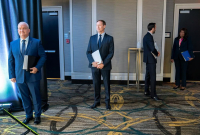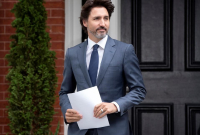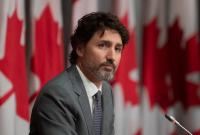Support strong Canadian climate journalism for 2025
The federal Conservatives want Prime Minister Justin Trudeau to testify before a parliamentary committee about his government's controversial decision to enlist WE Charity to administer a $900-million student volunteer program.
Conservative finance critic Pierre Poilievre laid out the demand Sunday amid growing pressure on Trudeau and Liberal cabinet ministers to explain the genesis of the sole-sourced deal with WE, which was announced late last month before being cancelled days later.
"He needs to explain where exactly the idea came from," Poilievre said during a news conference on Parliament Hill in which he acknowledged the rarity of prime ministers appearing before parliamentary committees.
"Did the WE organization call him and suggest it? Did it come through the staff in his office? Did it come out of his own head? Did members of his family who had been paid by the organization suggest it to him. We need to hear directly from him on these questions."
Trudeau announced the Canadian Student Services Grant on June 25, saying tens of thousands of students having a hard time finding summer work due to COVID-19 could volunteer up to 500 hours to earn the maximum $5,000 toward their post-secondary costs.
But the program came under immediate scrutiny after it was discovered that WE had been chosen to administer it. Trudeau said federal public servants had recommended the organization and that it was considered the only one capable of delivering the program.
Trudeau nonetheless faced accusations of cronyism and allegations of a conflict of interest over his past connections with WE. Those allegations have only grown after revelations his wife, brother and mother have been paid a combined $300,000 for appearing at a number of WE events.
The prime minister and Finance Minister Bill Morneau have both confirmed they did not recuse themselves from the cabinet vote that approved giving the contract to WE. One of Morneau's daughters has spoken at WE events while another does contract work for the organization.
Morneau's office has denied any link between his daughters' work and the WE agreement. The Conservatives and NDP have nonetheless asked Ethics Commissioner Mario Dion, who is already investigating Trudeau over the deal, to also look into a potential conflict of interest by Morneau.
The government and WE terminated the deal on July 3, which had promised the organization up to $19 million in payment depending on how many students participated. The federal employment and social development department has since taken over the program.
Poilievre said it is essential the prime minister appear before the finance committee personally to answer questions about the deal given that the controversy involves him personally and the House of Commons has been largely suspended due to COVID-19.
"Now there are two ways that this can be done," Poilievre said. "Either the prime minister can agree voluntarily to show up and attend and respect the invitation of a parliamentary committee. That is what he will do if he has nothing to hide.
"Or Parliament can compel him to appear. Something that would take longer, but could be done — and should be done — if the prime minister hides from accountability."
Such a move would need support from the Bloc Quebecois and NDP to even have a chance. Poilievre had yet to present his plan to the other parties on Sunday, but said: "If the opposition parties are interested in getting to the truth, they will vote in favour of that motion."
The Bloc Quebecois did not respond to requests for comment on Sunday while NDP finance critic Peter Julian was noncommittal.
"New Democrats believe in getting to the bottom of this and the more answers we get (including from Trudeau and Morneau) the quicker we can get those answers for the Canadian public," he said in a statement. "Canadians want answers and they need to know this won't happen again."
Even if the opposition parties agree to order Trudeau to appear before the committee using their superior numbers in the House of Commons, there is no guarantee it would happen, said University of Ottawa parliamentary expert Philippe Lagasse.
While the House of Commons can compel a member of Parliament to appear before a committee, Lagasse says that MP — in this case the prime minister — would likely ask the Speaker to rule on whether the request is appropriate or not.
"The House can say: 'In this case, we really need to hear from this person and therefore we're going to force them to appear,'" Lagasse said. "But that would require a ruling from the Speaker in all likelihood because there would be some differences of interpretation."
None of which addresses when Parliament would have a chance to address the issue, Lagasse said, given that the House of Commons is only scheduled to sit a total of three days between now and Sept. 21.
This report by The Canadian Press was first published July 12, 2020.





Comments
I have no interest in the outcome of this process (getting Trudeau to appear). We all saw the debacle of the SNC Lav inquiry. It demonstrated the lack of ethical concern for the law that the present government has. What I would like to see happen is a vote of non confidence but I understand why the other parties are somewhat loath to execute such an action at this time.